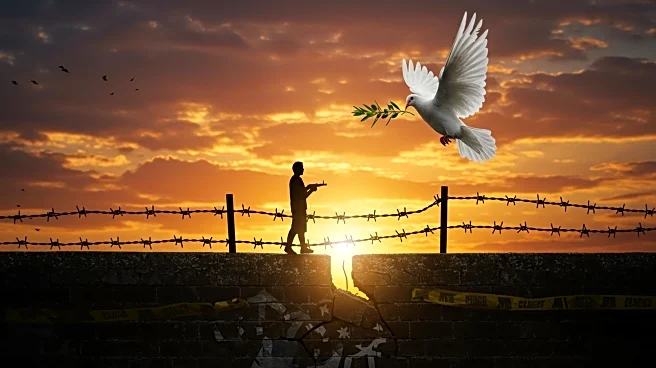What's Happening?
In Israel, hundreds of thousands of demonstrators gathered in Tel Aviv's 'Hostages Square' to demand an end to the ongoing conflict in Gaza and the release of hostages held by Hamas. The protests, which included a national strike, resulted in the closure of roads, offices, and universities. The Israeli government, led by Prime Minister Benjamin Netanyahu, has faced criticism from protestors who argue that the government's military actions in Gaza are endangering the lives of hostages. The protests were organized by families of the hostages and other groups opposed to the expansion of the war. The Israeli military has announced plans to allow aid agencies to bring tents and shelter equipment into Gaza as part of efforts to protect civilians in combat zones.
Why It's Important?
The protests highlight significant domestic opposition to the Israeli government's military strategy in Gaza, which could influence public policy and international relations. The situation underscores the humanitarian crisis in Gaza, where continuous bombardment has led to a 'catastrophic' situation, according to local authorities. The protests also reflect broader tensions within Israeli society regarding the handling of the conflict and the safety of hostages. The international community, including the UN Security Council, has condemned Israel's plans to occupy Gaza City, adding pressure on the Israeli government to reconsider its approach.
What's Next?
The Israeli government may face increased pressure to negotiate a hostage release deal and potentially alter its military strategy in Gaza. The continuation of protests and strikes could further impact domestic stability and influence political decisions. International reactions, particularly from humanitarian organizations and foreign governments, may also play a role in shaping the next steps in the conflict.
Beyond the Headlines
The protests in Israel could lead to a reevaluation of the ethical and legal implications of military actions in densely populated areas like Gaza. The humanitarian crisis and the plight of hostages may prompt discussions on international humanitarian law and the responsibilities of states in conflict situations. Long-term, the conflict could affect regional stability and Israel's diplomatic relations with neighboring countries and global powers.









